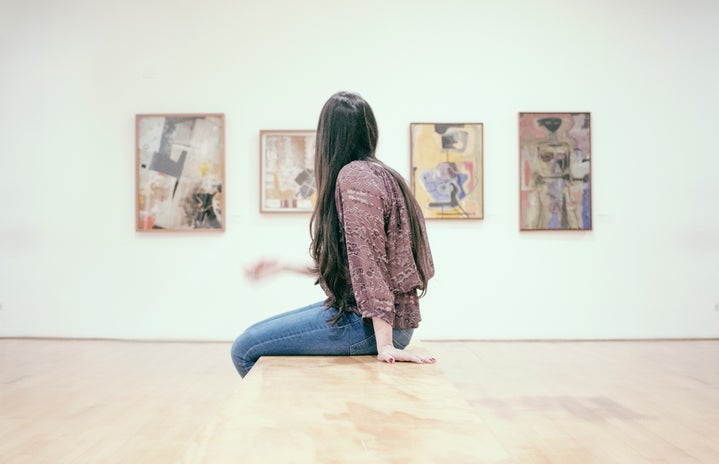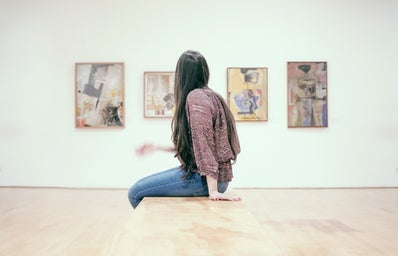An·he·do·ni·a (noun) – an inability to experience pleasure from activities usually found enjoyable.
It’s 8AM on a Sunday. I’ve showered, made my compulsory cup of coffee, and sit in anticipation at my desk. The morning light sifts into my room through an open window, scattering bright refractions across the blank pages of my notebook. I take a deep breath, grip my pen, and wait for thoughts of pulitzer-level-brilliance to spill.
Only it doesn’t.
For months, even years, I’ve been suspended in a self-induced state of inaction born from a paralyzing fear of incompetence. It’s closely intertwined with my incessant need for perfection. Everything that once brought me an immensity of joy has suddenly morphed into another trialing assessment of my creative aptitude and talent development (or lack thereof). Why won’t the right words come? Why does my painting lack dimension? Why does it come so naturally to everyone else but not to me? I’ve spent hours and hours on end staring at a blank canvas, a blank page, a blank screen, searching for that artistic impulse while swallowing the anxious desperation that is metastasizing in the pit of my stomach. I create, I destroy, I recreate. I am never satisfied and in the end, I am left with nothing. No matter how hard I try, I can’t seem to break past my self-imposed invalidism. Some days I am so convinced that I will give up painting and drawing and most of all writing, forever. That I will never pick up a pen again. I look at my hands and want to crush every bone in them because they taunt me at what they can but won’t do.
And for years I did. I bought towering stacks of books, but I didn’t read them. I carried around my sketch book and charcoal, but I didn’t draw. I closed the cover of my piano and put away my notebooks. I fell out of love with the one constant in my life since I was a child, as I grew to realize that I would never be good enough. Not for me, not for anyone else.
This past summer, I flew home to Hawaii for a few weeks to see friends and family: a brief but much-needed escape after experiencing the woes of corporate life during my 10-week internship. As often occurs when the right balance of restlessness and boredom strikes, I found myself rummaging through the garage, collecting forgotten belongings and sentimental trinkets in a sad little pile on the floor until I stumbled across my sister’s old journal when she was in college. Naturally, it was my duty as a younger sibling to spend the next hour nosily leafing through her pages when I suddenly spotted my name, ‘Han’ (she never calls me by my full name) scribbled at the top of an entry dated July 2010:
She’s nine.
Her face is stained with hints of mud, her hair speckled with sand. The monotony of math class does not interest her. She is an artist, seeing beauty in the mundane, the splash of color in the gray. She paints joy on everything she touches and drenches happiness on everyone she sees. Deftly, she creates, layering gold over browns, covering the vapid with vivacity. Signing her masterpieces with love. I watch her and hope that no critic will ever devalue her work, that her talent will never be sold, and that the world will always be, as it is now, her never-ending gallery.
Three thoughts cascaded through my mind almost instantaneously as I read her words. 1) I refuse to believe my face was “stained with hints of mud” and I’ll just attribute that detail to the creative liberties of writing. 2) I wasn’t that girl of nine anymore. I no longer saw the world in that way. 3) Why didn’t I? When did I lose the humility to see beauty and inspiration in all that I am surrounded by, to create simply because it’s what I love doing?
For so long, I’ve felt this pressure in art to see what no one else can see, to create what nobody else has created, to write what nobody else has written. But you don’t have to be good at something to love doing it. After all, art isn’t a ruthless demand for perfection. It shouldn’t breed superiority or pretentiousness or competition. It should make you feel something. I used to write because I couldn’t help it. Because I felt alone without it. Because it was the only way I could be unapologetically honest with myself. Deep down, that’s what it still means to me. It’s taken a long time and I still catch myself slipping but I’ve come to realize that it’s ok to let syntax and style and sophistication take a backseat to sincerity. It’s ok to take paintbrush to canvas and end up with a slightly more abstract piece than you were intending. It’s ok to make mistakes and indulge in the liberating freedom that only comes with complete acceptance.
To embrace art is to embrace imperfection.


